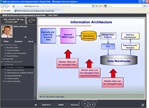 CIMP Data Architecture Package
CIMP Data Architecture Package
CIMP Data Architecture Package includes courses and exams necessary to earn Certified Information Management Professional (CIMP) designation in Data Architecture track at a great discount.
 CIMP Ex Data Architecture Package
CIMP Ex Data Architecture Package
CIMP Ex Data Quality Package offers comprehensive education in data governance capped with the highest level of Certified Information Management Professional designation (CIMP Ex) in Data Quality track at a great discount.
 CIMP Data Architecture & DCAM Package
CIMP Data Architecture & DCAM Package
CIMP Data Architecture and DCAM Package includes courses and exams necessary to earn Certified Information Management Professional (CIMP) designation in Data Architecture track plus DCAM certification at a great discount.
 CIMP Ex Data Architecture & DCAM Package
CIMP Ex Data Architecture & DCAM Package
CIMP Data Governance and DCAM Package includes courses and exams necessary to earn Certified Information Management Professional (CIMP) designation in Data Governance track plus DCAM certification at a great discount.
 Data Architecture Fundamentals
Data Architecture Fundamentals
This 5-hour online course looks at the concepts, principles,
and products of data architecture through six different lenses – business
alignment, data lifecycle management, data usage, content & structure,
processing & storage, and technology.
Instructor: Mark Peco and Dave Wells
 Designing and Implementing Analytics Data Architecture
Designing and Implementing Analytics Data Architecture
This
4.5-hour course explores modern data management challenges, describes modern practices
and data architecture design patterns, and describes a step-by-step process to
get from business requirements to a modern data management architecture that is
sustainable and adaptable to the future changes that are sure to come.
Instructor: Jed Summerton and Dave Wells
 MDM Fundamentals: Architecture and Implementation
MDM Fundamentals: Architecture and Implementation
This 4.5-hour course provides a comprehensive view of the critical elements for MDM success including business, architectural, people, process, project, and technology considerations. Learn from the real-world experiences of the instructor what it takes to make MDM work.
Instructor: William McKnight
 Data Integration Techniques for Designing an ODS
Data Integration Techniques for Designing an ODS
Business data integration is a complex problem that must be solved when organizations change or enhance their internal structures. This 3-hour online course presents a simple yet thorough process that describes the challenges of building an Operational Data Store (ODS) and the solutions to these challenges.
Instructor: Angelo Bobak
 Introduction to Graph Databases
Introduction to Graph Databases
This 4-hour online course
will provide
an overview of property graph database technology and teach the student how to
translate business requirements to a property graph database design that can be
implemented on any modern property graph database.
Instructor: John Singer
 Data Modeling Fundamentals
Data Modeling Fundamentals
This 4 hour and 45 min. online training teaches practical data modeling skills ranging from traditional relational modeling to key-value, document, graph, and semantic data modeling.
Instructor: Dave Wells
 Deciphering Data Architectures
Deciphering Data Architectures
This 4-hour course teaches which data architecture frameworks are best suited for specific business needs and how to implement them effectively to ensure data integrity, availability, and usability.
Instructor: James Serra